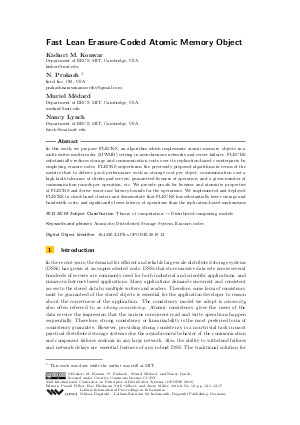Fast Lean Erasure-Coded Atomic Memory Object
Authors Kishori M. Konwar, N. Prakash, Muriel Médard, Nancy Lynch
-
Part of:
Volume:
23rd International Conference on Principles of Distributed Systems (OPODIS 2019)
Part of: Series: Leibniz International Proceedings in Informatics (LIPIcs)
Part of: Conference: International Conference on Principles of Distributed Systems (OPODIS) - License:
 Creative Commons Attribution 3.0 Unported license
Creative Commons Attribution 3.0 Unported license
- Publication Date: 2020-02-11
File

PDF
LIPIcs.OPODIS.2019.12.pdf
- Filesize: 1.39 MB
- 17 pages
Document Identifiers
Subject Classification
ACM Subject Classification
- Theory of computation → Distributed computing models
Keywords
- Atomicity
- Distributed Storage System
- Erasure-codes
Metrics
- Access Statistics
-
Total Accesses (updated on a weekly basis)
0Document
0Metadata
Abstract
In this work, we propose FLECKS, an algorithm which implements atomic memory objects in a multi-writer multi-reader (MWMR) setting in asynchronous networks and server failures. FLECKS substantially reduces storage and communication costs over its replication-based counterparts by employing erasure-codes. FLECKS outperforms the previously proposed algorithms in terms of the metrics that to deliver good performance such as storage cost per object, communication cost a high fault-tolerance of clients and servers, guaranteed liveness of operation, and a given number of communication rounds per operation, etc. We provide proofs for liveness and atomicity properties of FLECKS and derive worst-case latency bounds for the operations. We implemented and deployed FLECKS in cloud-based clusters and demonstrate that FLECKS has substantially lower storage and bandwidth costs, and significantly lower latency of operations than the replication-based mechanisms.
Cite As Get BibTex
Kishori M. Konwar, N. Prakash, Muriel Médard, and Nancy Lynch. Fast Lean Erasure-Coded Atomic Memory Object. In 23rd International Conference on Principles of Distributed Systems (OPODIS 2019). Leibniz International Proceedings in Informatics (LIPIcs), Volume 153, pp. 12:1-12:17, Schloss Dagstuhl – Leibniz-Zentrum für Informatik (2020)
https://doi.org/10.4230/LIPIcs.OPODIS.2019.12
BibTex
@InProceedings{konwar_et_al:LIPIcs.OPODIS.2019.12,
author = {Konwar, Kishori M. and Prakash, N. and M\'{e}dard, Muriel and Lynch, Nancy},
title = {{Fast Lean Erasure-Coded Atomic Memory Object}},
booktitle = {23rd International Conference on Principles of Distributed Systems (OPODIS 2019)},
pages = {12:1--12:17},
series = {Leibniz International Proceedings in Informatics (LIPIcs)},
ISBN = {978-3-95977-133-7},
ISSN = {1868-8969},
year = {2020},
volume = {153},
editor = {Felber, Pascal and Friedman, Roy and Gilbert, Seth and Miller, Avery},
publisher = {Schloss Dagstuhl -- Leibniz-Zentrum f{\"u}r Informatik},
address = {Dagstuhl, Germany},
URL = {https://drops.dagstuhl.de/entities/document/10.4230/LIPIcs.OPODIS.2019.12},
URN = {urn:nbn:de:0030-drops-117988},
doi = {10.4230/LIPIcs.OPODIS.2019.12},
annote = {Keywords: Atomicity, Distributed Storage System, Erasure-codes}
}
Author Details
References
- Intel® Intelligent Storage Acceleration Library (Intel® ISA-L). https://software.intel.com/en-us/storage/ISA-L. [Online; accessed 23-August-2018].
- libstatgrab. https://www.i-scream.org/libstatgrab/. [Online; accessed 23-August-2018].
- ZeroMQ: Distributed Messaging. http://zeromq.org/. [Online; accessed 23-August-2018].
-
H. Attiya, A. Bar-Noy, and D. Dolev. Sharing Memory Robustly in Message Passing Systems. Journal of the ACM, 42(1):124-142, 1996.

- Christian Cachin and Stefano Tessaro. Optimal Resilience for Erasure-Coded Byzantine Distributed Storage. In 2006 International Conference on Dependable Systems and Networks (DSN 2006), 25-28 June 2006, Philadelphia, Pennsylvania, USA, Proceedings, pages 115-124, Los Alamitos, CA, USA, 2006. IEEE Computer Society. URL: https://doi.org/10.1109/DSN.2006.56.
-
Viveck R. Cadambe, Nancy A. Lynch, Muriel Médard, and Peter M. Musial. A coded shared atomic memory algorithm for message passing architectures. Distributed Computing, 30(1):49-73, 2017.

-
Yu Lin Chen Chen, Shuai Mu, and Jinyang Li. Giza: Erasure coding objects across global data centers. In Proceedings of the 2017 USENIX Annual Technical Conference (USENIX ATC ’17), pages 539-551, 2017.

- Giuseppe DeCandia, Deniz Hastorun, Madan Jampani, Gunavardhan Kakulapati, Avinash Lakshman, Alex Pilchin, Swaminathan Sivasubramanian, Peter Vosshall, and Werner Vogels. Dynamo: Amazon’s Highly Available Key-value Store. In Proceedings of Twenty-first ACM SIGOPS Symposium on Operating Systems Principles, SOSP '07, pages 205-220, New York, NY, USA, 2007. ACM. URL: https://doi.org/10.1145/1294261.1294281.
-
A. G. Dimakis, K. Ramchandran, Y. Wu, and C. Suh. A survey on network codes for distributed storage. Proceedings of the IEEE, 99(3):476-489, 2011.

- Partha Dutta, Rachid Guerraoui, and Ron R. Levy. Optimistic Erasure-Coded Distributed Storage. In DISC '08: Proceedings of the 22nd international symposium on Distributed Computing, pages 182-196, Berlin, Heidelberg, 2008. Springer-Verlag. URL: https://doi.org/10.1007/978-3-540-87779-0_13.
- G.R. Goodson, J.J. Wylie, G.R. Ganger, and M.K. Reiter. In Dependable Systems and Networks, 2004 International Conference on. URL: https://doi.org/10.1109/DSN.2004.1311884.
-
James Hendricks, Gregory R Ganger, and Michael K Reiter. Low-overhead byzantine fault-tolerant storage. ACM SIGOPS Operating Systems Review, 41(6):73-86, 2007.

-
W. C. Huffman and V. Pless. Fundamentals of error-correcting codes. Cambridge university press, 2003.

-
K. M. Konwar, N. Prakash, E. Kantor, N. Lynch, M. Médard, and A. A. Schwarzmann. Storage-Optimized Data-Atomic Algorithms for Handling Erasures and Errors in Distributed Storage Systems. In 2016 IEEE International Parallel and Distributed Processing Symposium (IPDPS), pages 720-729, May 2016.

-
Kishori M Konwar, N Prakash, Nancy Lynch, and Muriel Médard. RADON: Repairable atomic data object in networks. In The International Conference on Distributed Systems (OPODIS), 2016.

-
Leslie Lamport. On Interprocess Communication, Part I: Basic Formalism. Distributed Computing, 1(2):77-85, 1986.

-
Leslie Lamport. Fast Paxos. Distributed Computing, 19:79-103, October 2006.

-
N Nicolaou, V Cadambe, N. Prakash, K.M. Konwar, M. Medard, and N Lynch. ARES: Adaptive, reconfigurable, erasure coded, atomic storage implementing a register in a dynamic distributed system. In International Conf. on Distributed Computing Systems (ICDCS), 2019.

-
A. Spiegelman, Y. Cassuto, G. Chockler, and I. Keidar. Space Bounds for Reliable Storage: Fundamental Limits of Coding. In Proceedings of the International Conference on Principles of Distributed Systems (OPODIS2015), 2015.

-
Heng Zhang, Mingkai Dong, and Haibo Chen. Efficient and Available In-memory KV-Store with Hybrid Erasure Coding and Replication. In 14th USENIX Conference on File and Storage Technologies (FAST 16), pages 167-180, 2016.

